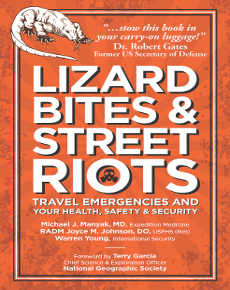Full Article:
You are making flight arrangements for that special trip: an exotic locale, an adventure tour, or a scientific expedition. Maybe someplace featured in these very pages! Your immediate excitement has been tempered by sobering thoughts of health and safety. You have searched the internet for travel advisory information about your developing world destination. The travel agent may have been to the area but probably stayed in a nice hotel in the capital city. You will stay there but have plans for a journey to see the temples in rural areas where accommodations are likely lower standard. You have been advised to sign up for travel insurance but you are inundated with confusing choices about insurance. There is just the usual generic advice about the site - drink only bottled water, get immunization for hepatitis and meningitis, have a tetanus shot within the last 10 years, eat only well-cooked food. Your local physician has little experience with travel medicine. Information about local health resources is non-existent or unreliable. Geopolitical information resources say the area is reasonably stable but there has been sporadic violent insurgent activity in rural areas for years and travel is advised with caution. Zika virus has been reported in the adjacent country. What should you do to prepare for your travel safety?
TRAVEL HEALTH
International travel has exploded over the past few decades with US residents making 61 million trips outside the US in 2009. There were 3.5 billion air travelers accounting for 2.3 trillion air miles in 2014 with more than half of these on international flights. Health problems are self-reported in up to nearly two thirds of people traveling to the developing world with about 8 percent of travelers becoming ill enough to seek medical care abroad or upon return home. Hmmm….8 percent of that huge number of travelers is a big number!
Ninety-two percent of American travelers desire immediate access to U. S. quality health care and the option to be transported home to receive treatment. Without medical evacuation insurance this is not likely to occur without very high personal cost to the victim.
BASIC INSURANCE GUIDELINES
Insurance coverage may be bundled in one policy or require separate policies. There are 3 major components of travel insurance: travel assistance, medical coverage, and evacuation. The most important are coverage for medical costs and evacuation.
- Travel assistance: lost luggage, trip cancellation, visa services, immunization advice. This is the sizzle and not the steak in these packages because travel assistance costs pennies to provide.
- Medical coverage: medical expenses with limits and deductible fee. You may have adequate coverage with your personal medical insurance so please check.
- Evacuation: necessary medical evacuation of injured person, spouse or significant other, return of mortal remains.
- Check your own medical policy for coverage and exclusions particularly for international travel.
- Even with adequate medical insurance coverage, you may have to pay costs for medical treatment in a foreign country then get reimbursed by your insurance company after you return.
- Common exclusions for medical and evacuation insurance include travel to an area of armed conflict, age greater than 75, adverse events due to alcohol or illicit drug use, withdrawal from chronic alcohol or drug abuse, and exacerbation of known psychosis. Policies may exclude coverage for your planned activities (such as helo skiing, scuba, hang gliding). Make sure your policy covers you for adventurous activities.
- Medicare and most health maintenance organizations (HMOs) do not cover medical problems on international travel.
- Tour groups and travel companies do not usually provide medical coverage or evacuation. They will likely assist their traveler but will not cover costs associated with healthcare, transportation, or evacuation.
- Make sure you have evacuation insurance if traveling to a remote area. Most credit cards do not have adequate coverage for evacuation expenses. Evacuation can cost over $100,000. The decision for evacuation and the process is complex and often poorly understood by the traveler and family.
Find out how an evacuation will occur if needed and how communication will be addressed. Speak to the company holding your policy and ask what happens if you need their services. Find out if you will speak directly to a physician or if communication will occur between the company representatives and the healthcare providers on scene.
Essentially, there are three points that matter when it comes to travel and evacuation insurance: the quality and capability of the organization you have contracted with to protect you from risk, determination of what services are covered, and the exclusions for coverage. Travel safely!
Michael J. Manyak, MD
VP National Eagle Scout Association
Chief Medical Advisor for Crisis Response, Accenture
Author, Lizard Bites and Street Riots, Travel Emergencies and Your Health, Safety, and Security
Twitter: @LizardBites
June 10, 2023








